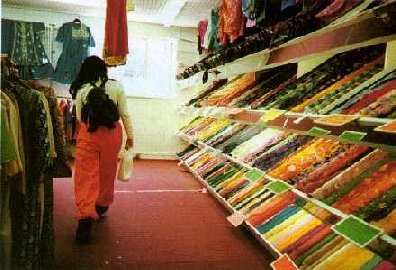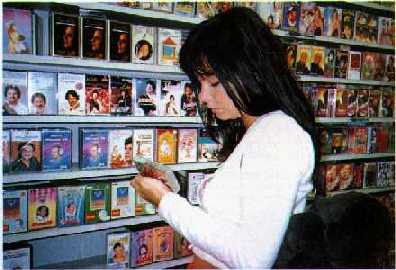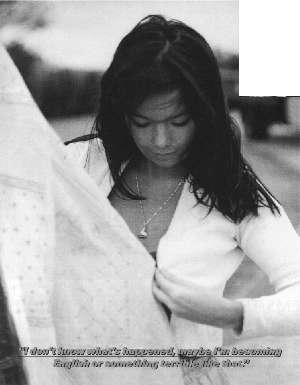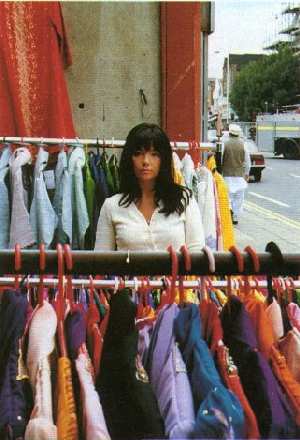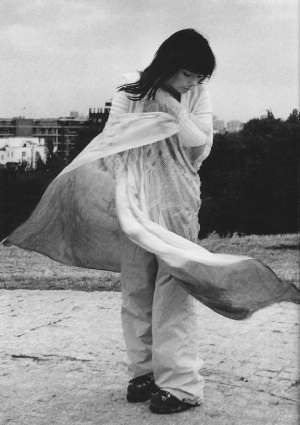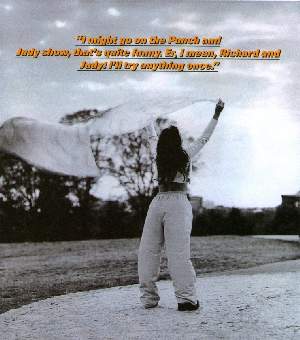Sky 12/95Björk's World -
|
|
We've lost her. Björk isn't tall, and right now she's buried under 10 thousand million metres of fluorescent Indian silk - saris, wraps, lenghts of material, holding them up to the light, letting threads of gold and green and pink and silver shine across the face of pop's most enthusiastic magpie. She buys three sari wraps, L20 each. At home she already has "thousands. They're so feminine in a very powerful way, just full of pleasure, it's... enjoy life to the max." Then it's the shoe shop: "Look! Shoes with piano keyboards on them! And Cinderella shoes... oooh, look at these gold ones, and those..." And then it's the video shop, with well-informed queries culminating in the purchase of wailing Indian legends called Nusrat Fati Ali Khan and Latake Geet. Chuffed, she bundles them in her teddy-bear back-pack, buys a Magnum ice-cream and strides purposefully, once more, because she always strides, along the High Street, lolly aloft, towards the "wicked" Indian temple. There, she'll refuse to pray because that would be "sacreligious. Hundreds and hundreds of years of culture and people think they can be part of it by spending five minutes on their knees. That's rude." So she has a good laugh instead at a passing van emblazoned with the sign HIMALAYAN CARPETS. "That," notes Björk (a self confessed lover of bad jokes), "would be a lot of work. Heheheh."
We're pottering around Southall, south west London, near Heathrow. It's Björk's favourite place (see below) in the whole of London, the township devoted to the capital's Indian community where you can purchase things which shine in emporia called "Jolly Fabrics" and "Modern Footwear for Comfort and Value." Carnaby Street can go whistle. "I think I used to go here to sympathise with the immigrants," she laughs. "It almost makes it comical how you don't fit in, if you don't fit in. You see these gorgeous Indian women wearing trainers and track-suits over their saris and the men are all in the pub. I completely felt like I didn't fit in the first two years. I think what changed was I got the sense of humour . . . " Björk's lived full-time in London for three years now, three years of elevation from one-time Icelandic punk obscurity to charismatic creator of sublime, sensual pop music securing her place as global pop-icon. These days she copens tunes for Madonna (Bedtime Stories) and drinks with Michael Stipe and Anton Corbijn. You get the impression, however, that she'd be just as happy in the pub in Southall with the Indian grandads talking about cricket.
It's been the year of the Post LP, a year when Björk's done more living and less promoting than the saturation whirl of the Debut album; the one which gave her the power to decide, this time around, just what press she does and doesn't do. "I've just said `no fucking way' up until now " she grins. "I don't know what's happened, maybe I'm becoming English or something terrible like that. I couldn't have gone on some TV show in Korea or whatever; I wouldn't have known what the fuck was going on. So now I'm doing things for a laugh. Like this. And I might go on the Punch and Judy show, that's quite funny. Er, I mean, Richard and Judy! I'll tiy anything once." Björk was 16 when she first landed in London with her "pop punk group" Tappi Tikarass. It was the first time she'd ever been in a city, and she stayed in Kilburn at the home of her hippy mum's mate, a psychotherapist. "We were these four punks from Iceland," reflects Björk, "and I think after two days we did her head in. I walked out of the house and was walking and walking and walking, trying to walk out of the city because you do that in Iceland; you say `I'm just going out for a walk,' and walk straight out of the city because you're always by the ocean. I ended up finding some dreadful cemetery, very depressing. I kept washing, like, three times a day, because I could feel the dirt on my skin. I was touching bricks and it felt like it was all grease. It sounds really funny now, but believe me it wasn't funny at the time: I completely couldn't handle it. This whole city felt so grey with nothing interesting. We went to the studio to record every day and I ended up crying myself to sleep every night for two weeks." Funny what you get used to. Every six months from then on, Björk returned to London with whatever band she was in at the time. Einar from the Sugarcubes moved to London and she "slow- ly got to know it," but today she has a confession. "I'm sorry!" she says, "but I'd be lying if I said I liked London. I moved here because I had to do the record: it was like a mission. I thought I'd come here, do the record and then go home. And it all took off and took me totally by surprise." When she first moved, she, deliberately caused trouble. "I hated it," she says, "and was playing difficult to get and driving my boyfriend mad saying `Why are the taps on the bath-tub that shape?' Terrible. I lived near Primrose Hill and that was the only way I could bear it, if I had a view. There's something really nice about being able to see over somewhere, like putting your head out of the water once in a while: `So, that's where I am, OK,' and then going back to where you were. Now, and it's a cliche and this is gonna sound really pukey, you're gonna be sick now, but there's so many people here I truly love; people who've gone out of their way to be there for me in the unbelievable pressures.That's what makes you feel good in the city. But I can see that the beauty ofthe city is that people go so much out of their way to survive here and have a good time. You try a lot harder and that sort of energy you don't get any other place." Björk thinks it's "weird" what's happened to her since the move, even though she's been a pop star for over 10 years. She's still not used to the "schizophrenic behaviour" it brings out in the sturdiest ofsouls. "When I was a teenager in Iceland," she wists, "I had the ocean and the scenery and the little cafe's and fishermen and then I go to... Manhattan and never sleep and become this totally extrovert character, then I go home and don't talk for a month. It can still be like that." It's going to get even more like that next year because she's buying her very own island. "I am!" she shouts, belting me in the chest with excitement, "in Tunisia! You know you can buy an island for 50 grand? I'm going to buy one, with a house and everything - cheaper than a flat in London," she points out, belting me again. "I'm doing that next summer, that'll be my base. I started thinking about it two years ago and when I decide something, that's it: that's a decision [reconsiders] . Actually, I decided when I was a kid I was going to move to an island - the ocean makes my head function better. I'll be going there on my own but you know what it's going to be like, don't you? A fucking health farm for all my friends. They'll come to me just before they have that nervous breakdown. I'm thinking about this one tiny island with one gorgeous building, a Greek chateau building from the 13th century. That one's 40 grand. I don't know whether I want one with a little village with shops and people to talk to or one with nothing at all. Then I'll come to London for little trips and go completely bonkers and then go back home."
"He's cool about it," says Björk, "he's been digesting the idea for two years already." She's not worried by his supposed Tarzanesque education option on a desert island, either. "He gets most of his education through the Internet anyway," she muses. "He's a bit of a professor, he reads encyclopedias while other people play football [giggles] . He's wicked - I'll be chatting with my friends and talking about different countries, say Madagascar and I'll say `What's the religion in Madagascar again, Sindri?' and he'll know it right off. He knows more about Bosnia than I do." What will he do with all those brains? "A teacher, a poet, a librarian, so many things," ponders Björk. "School was always just for social reasons, to be able to get long with people you don't actually like. You get along with your friends because you handpick them, but you need to get along with everybody else." Logically put. Björk likes sex. Sometimes, to rid herself of sexual frustration, she does karate, swims and masturbates every day. And sometimes she has a boyfriend. Sexually, she calls herself "outrageously greedy." She throws herself into love, too. You can hear it on It's So Quiet, her stunning new single, a cover of the old Betty Hutton big-band classic. "People think my version is over the top" she surmises, "but hers makes mine the ambient version! I guess the song describes pretty well what being in love feels like because it's in and out, innit?" Certainly is, mate. "Wahahah!" So, what about right now - is it in, or is it out? "Nah!" splutters Björk. "That's a secret! It's one of those things that is so delicate. I could come out with a bag of lies and tell you I sleep with three transvestites every single night. But I'm not going to lie I'm not going to say any- thing heheh. Everything's. . . OK." Björk, incidentally, is a double Scorpio, which, if you're interested, means a formidable, possibly troublesome, double dose of sex and secrecy and passion. So shake in your shoes, big boys. . . Like all the world's passionate people, Björk lives in the sensory world; a world where even the bin-man's up- ward swing could be construed as an act of eroticism. Despite her bargain-hunting Southall know-how, she will allow herself ex- pensive whims. Oysters and champagne, for example. In Harrods Oyster Bar, in the corner next to the pheasants. She knows there's a link between sexual and food appetites, that you can tell things about people sexually by the way they eat. "Oh God, yeah, definitely," she says. "And it's that way with all things. Definitely. By the way you talk, how you move, what words you pick, how you touch things, what colours you like, what material you wear, everything. I've always preferred looking at the word erotic in that way; it's not about literally shagging. You can drive a car in an erotic way. You can quite simply lead your life in a turned-on way.
Right now, she's making sensual cheese, bread and crackers in the kitchen of her west London home even though she'd rather have sensual lemon squid from the Thai down the road. She's "starving," though, so she must eat now. Her brother's here (blond, skinhead, handsome devil); so's Sindri (blondish, fine- haired, handsome devil) and she's clattering round the CD-littered kitchen wielding gold and silver mugs full of tea to which the assembled must "help yourselves!"
She puts a film on called Hard Boiled, featuring her favourite actor, "Beat" Takeshi, and coos and blithers about how "Robert De Niro handsome" he is. On the answerphone there's a message from Jarvis Cocker who's been on holiday in Iceland. Björk, who hardly knew him at the time, gave him the keys to her Iceland home so he wouldn't have to stay in a character-free hotel. Videos, CD, tapes, bottles, brightly-coloured cardboard tubes with the usual essential rubbish spilling forth abound. Look up and right and there's a balcony on high, beyond which lie the beds of Björk and Sindri. Look left to the wall and there's a huge sculpture of what looks like the inside of a shell - it's made from concrete and flecks of blue glass. "My friend in Iceland makes them," explains Björk. "It's modelled on a shell but, I'm sorry, you can see it's actually a disco cunt." She's right. Björk's brought us here to show us the things she loves most in the world, the things and people who've ignited her imagination and helped form the core psyche of one of the most original minds in pop culture today. And in one hour she'll throw us all out because she has a far more important mission to indulge, one she's been thinking about all day: watching the new Steve Coogan video which she nicked from her record company offices earlier today. "Comedy is like syphilis," she laughs, reading from the back ofthe video. "You've either got it or you haven't. Steve Coogan's got it. Aharghargh!!" At home with the video, pop-corn, Sindri and her brother - she can't wait. Nights in like this won't be happening too often for the rest of the year; a stream of promotional duties will see her heavily involved with the chores of celebrity right up until Christmas, when she'll return to Iceland, like she always does. She can't wait for that, either. "I love Christmas," she says.
"The presents,
everything about it. Me and Sindri always get a
really tall Christmas tree and decorate it ourselves.
One time we had one four metres tall and
Sindri decorated it so all the baubles were at his
eye-level. I was `Do you mind if I put some
above?' and he was really hurt - `Mum! Don't
you like the way I've decorated?' `Yes but I'm
looking at green!' The snow's incredible there -
two, three metres high and you have to walk
through little tunnels with lighters and
scarves. You go into shops and they give you hot
chocolate with cognac in it - it's the best.
Everyone wears those overalls, really thick,
woolly inside, like the ones people wear to fix
the road. With bikinis inside. Hehheh. There's definitely something about Björk which makes a nonsense of the old Stone Roses adage which insisted "It's not where you're from, it's where you're at." Björk couldn't come from anywhere other than Iceland, the long-independent island which invented the first-ever democracy in history through sheer bloody-minded Viking self preservation, romanticism and passion for life. "There was this survey done around the world," says Björk, munching on a hunk of cheese, "where all the people were asked 100 standard questions and one of them was `What do you believe in?' The people of Iceland stood out because they all said `Myself.' That's very deep in our character: in history we were the biggest rebels on the planet. It's always said that the reason we don't have an army is because it would be impossible for everyone to walk in rhythm - everyone would have to walk differently." And thus Björk's friends are much like herself: individuals, from Iraqis to Japanese to half Jamaican Irishmen - and that's just her current band. She's the sort with a house full of chums at all times. "I really like people staying," she says. "In Iceland, people would just walk in to my house and start cooking for everyone. That sounds really hippy but I love it. Surviving like that doesn't just happen, though - it's cultivated; you have to trust people. So I'll always have a house full with me cooking and looking after everyone going `Have you eaten yet?'" "God!" she shrieks, flying upstairs to answer the phone, trousers still billowing, stride still purposeful, magical aura still intact, "you know what that means, don't you? I'm going to be such a granny. . . "
|
| SAHKO |
|
|
| JEFF MILLS |
|
|
| PERSONAL DAT MACHINE |
|
|
| HOLLDOR LAXNESS |
|
|
| "BEAT" TAKESHI |
|
|
| TAMPOPO |
|
|
| EGGERT MAGNUSSON |
|
|
| STOCKHAUSEN |
|
|
| MESSAIEN |
|
|
| PERFUME WHICH MUST REMAIN NAMELESS |
|
|
| REN AND STIMPY |
|
|
| MOVING MAP OF THE WORLD |
|
|
